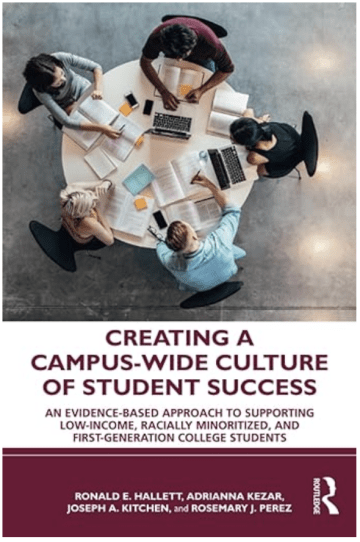
Adrianna Kezar, a national expert of change and leadership in higher education, Dean’s Professor of Leadership and director of the Pullias Center for Higher Education, discusses her new book Creating a Campus-wide Culture of Student Success (Routledge) hitting bookshelves on October 23. The book, co-authored by Ronald E. Hallett, Joseph A. Kitchen and Rosemary J. Perez, offers a new approach to institutional practices and describes evidence-based strategies to create a campus culture conducive to supporting all students.
What motivated you to write Creating a Campus-wide Culture of Student Success?
For two decades, my work has focused on the need for campuses to transform and undergo culture change in order to promote the success of student groups that historically have not been successful. My work has always challenged the prevailing views of “fixing” the student and a deficit approach to student success. And, I have always been concerned that we approach complex problems in simplistic, unsystemic ways that preserve the status quo instead of making progress on key issues.
This belief motivated the study that this book draws from our six-year study on college student transition and success focused on historically marginalized groups called Promoting At-Promise Student Success Project (PASS). The term ‘at-promise’ is intentionally used in our work to move away from deficit descriptions of historically marginalized groups which focus on what they do not possess such as low-income or minority. The PASS findings provide extensive empirical evidence that challenge conventional wisdom that students need interventions and support services to fix what is missing from them and instead shows how campuses need to change to better support students. Campuses were not designed or set up to support low-income, first generation or racially minoritized groups.
The abstract discusses a new approach to institutional practices. How different is this from previous approaches?
The book promotes an approach that is fundamentally different in demonstrating the need to break down bureaucratic silos that prevent students from succeeding and establishing an ecological approach where campus offices and staff/faculty/administrators work in concert to support students. It also focuses on how educators work with students being validated instead of what they do. The previous approaches to student success focused on programmatic interventions—summer bridge programs, first-year seminars, supplemental instruction. These are all fine things, but they tend to just delay students’ drop out, not create student success. True student success is not about programs and services but about campus culture change which means educators approaching their work—all their work—differently.
Can you discuss a few of the topline concepts and practices of the PASS Project?
The two main aspects are being validated and being ecological in approach, that we termed ecological validation. Validation means that campus faculty, staff and administrators believe that all students can succeed and that they interact with students with this expectation. Being ecological is a recognition that for students to be successful we need to think about them not just at the moment we are interacting with them but thinking about their previous educational experiences, their future experiences and their various experiences which can include their jobs, family, other classes and other educators, for example.
We found a set of additional educational practices tied to promoting these two core areas of validation and ecology. These include principles such as being proactive—not waiting until the student is faltering; identity conscious in terms of being aware of and celebrating students' distinct and individual backgrounds; being holistic and expressing interest in a student’s personal life; and asset based which means identifying and drawing on their strengths. It also means being intentionally collaborative—working across units to support students, connecting a student directly with a mentor, faculty member or support service.
Is there anything else you’d like to include?
Culture change happens when we recognize that people and systems need to change. As people learn about new ways to be educators—then they change their structures, policies and practices which changes the system. The two can happen in tandem, so we also see that campuses can change reward structures, admissions policies and service ethics and this can in turn reshape educators. The campuses we studied worked in both directions. Campuses that actually want to make progress on at-promise student success now have a roadmap.






